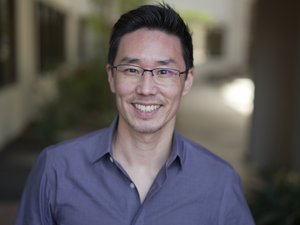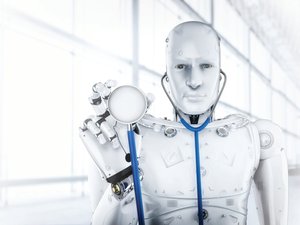
"Me, I'm not human… but I respond like one, see?"
William Gibson wrote those words in the 1984 science fiction novel “Neuromancer” in which a hacker gets pulled into a dystopian cyber world where a computer program seeks his help with transforming into an even more powerful AI system.
Gibson was playing with the concept of software that behaves and talks in a human-like way. Nearly four decades later, a real-world version — though much less sophisticated — has taken the Bay Area by storm and captured the world’s imagination.
Far from being science fiction, so-called generative AI is a field of research that creates artificial intelligence software that can seemingly engage in conversations, write essays and even make art based on simple, plain English prompts.
It takes large, continuous flows of new data to train, though. And more data means more storage and compute, which becomes incredibly expensive very quickly.
So, when OpenAI LLC publicly released DALL-E 2 and ChatGPT last year, the San Francisco startup sparked curiosity across the internet — not only among casual users, but among entrepreneurs and investors who recognized its commercial potential. DALL-E 2 captured imaginations by generating images from simple phrases. And ChatGPT raised the bar by allowing anyone to instantly become a wordsmith.
Companies that had been quietly using AI over the past few years suddenly started highlighting it, while venture capital investors began hunting for any opportunity to show they were taking advantage of the moment. The San Francisco Bay Area, once again, stands in the center of a major technological shift. But is generative AI overhyped? And will unresolved ethical questions halter its path to mass adoption?
Hyped up
Few companies are actually building AI technology. Even fewer are doing so with generative AI.
Globally, the number of generative AI companies founded each year has nearly doubled from 67 in 2018 to 124 in 2021, according to PitchBook Data. In 2022 this dropped to just 46, and 2023 is off to a slow start with only four new companies founded through early March.
Despite the slowdown — broadly triggered in 2022 by rising interest rates, a tech stock rout and recession fears — San Francisco and the Bay Area have remained a stronghold for AI founders.
More than 40% of all generative AI companies founded globally last year were based in the Bay Area — of that, more than half were started in S.F., according to PitchBook. In 2023, two of the four companies founded are in S.F.
“I’m hugely bullish on the Bay Area, New York, and a handful of other areas,” SignalFire founding partner Chris Farmer said. “The incumbency of the Bay Area with all the hardware, software, AI, the great universities, but also so many companies from different industries that have set up their technology outposts here. I think we’re going to continue to thrive.”
In February, the San Francisco venture capital firm announced it had closed on $900 million in new funds for use across its portfolio with an emphasis on AI.
“The number of companies that claim to be AI companies is about as prolific as people adding .com to their company name in 2000,” Farmer said, and “generative AI is probably the most overhyped subset.
“I think there’ll be a whole wave of companies that succeed and there will be other areas where there’s an army of overfunded companies … Maybe one of them becomes the dominant winner, but that’s where typically a lot of money’s gonna get lost in the hype.”
Even Big Tech has been spurred to action so as to not let some well-funded upstarts eat their lunch.
Microsoft and Google have been researching and developing AI software for years, but in recent months rushed to unveil their respective chatbots that were, perhaps, not quite ready for general use.
In 2015, Google published research about neural networks and natural language processing. At that time, the models were still “large and difficult to run … not broadly accessible … and expensive to use as a cloud service,” Sequoia partners Sonya Huang and Pat Grady wrote in a blog post in September. But they said it ushered in a new era and “the earliest Generative AI applications begin to enter the fray.”
Both tech giants have also invested heavily in generative AI startups.
Microsoft poured $3 billion into OpenAI from 2019 to 2021. This January, the two companies signed a multiyear agreement reportedly worth up to $10 billion and established Microsoft as OpenAI’s ongoing exclusive cloud services provider.
Less than two weeks later, Google reportedly invested $300 million into Anthropic, a generative AI company based in San Francisco that was co-founded in 2021 by Dario Amodei, a former OpenAI researcher who led safety initiatives. By early March, Anthropic, seen by many as a direct rival to OpenAI, was raising another $300 million in a round led by Spark Capital, putting its valuation at more than $4 billion, according to The Information.
Amodei left OpenAI over disagreements with others within the organization about its direction and more than a dozen other OpenAI researchers followed him.
Even Meta Platforms has pivoted to AI. CEO Mark Zuckerberg announced in February that he was assembling a new AI team just a few weeks after declaring 2023 the “year of efficiency.”
And the following month, Salesforce launched a $250 million generative AI venture fund and announced it would integrate OpenAI’s tools.
They’re all racing to capture customers and market share. Globally, generative AI is expected to reach $98 billion in revenue by 2026, according to PitchBook.
A new valley?
San Francisco knows boom times as intimately as it knows the busts. Local Web 2.0 giants like YouTube, Facebook, WhatsApp, Twitter, Airbnb, Lyft, Uber, Waymo, Pinterest and Slack were incubated in the post-Dot Com era. Their rise was fueled by the internet — first on computers, then on mobile.
The next big tech wave could be catalyzed by AI, and founders in the space may find that they need to be in San Francisco, where proximity to investors and other industry insiders is advantageous.
Chinar Movsisyan founded a startup called Manot in August 2021 to combat bias in AI-powered software. Originally from Armenia, she moved to L.A. about a year later to be near some early investors and establish the company in the U.S., but soon realized she needed to be nearly 400 miles north.
By October, she was accepted into UC Berkeley’s SkyDeck accelerator and moved herself and the company up the coast. Her product developers are all in Armenia, but Movsisyan will be hiring other teams in the Bay Area.
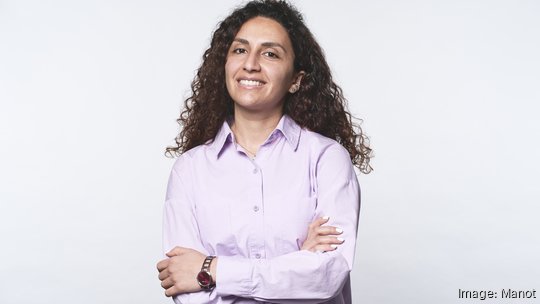
“Business development, sales, marketing, this should be in San Francisco and the Bay Area,” Movsisyan said, and “the product team and developers should be together. … It is really important especially when you are an early-stage startup.”
One S.F. neighborhood is becoming an AI hot spot. Tech workers have been organizing co-living and coworking spots around Hayes Valley, garnering it the nickname Cerebral Valley.
“AI seems to be the one thing in the startup world that demands in-person (right now) so much so that if you’re not in S.F., you’re at a disadvantage,” Bloomberg Beta investor Amber Yang tweeted in January.
The money has also been flowing.
Generative AI companies in San Francisco and cities in its immediate area have raised close to $6.1 billion across 228 deals since 2018, according to PitchBook Data.
Companies in the San Jose and its immediate area raised $1.1 billion across 43 deals over the same period. New York City startups raised slightly more — $1.3 billion across 73 deals — but funding and deals slowed there beginning in 2022 while growth accelerated in San Jose.
As of early March, San Francisco appears to be maintaining its lead. Companies there have raised more than $215 million across 12 deals so far this year, while only two San Jose companies have raised $55 million. And only three companies in New York have raised just over $2 million, combined.
In February, an AI-powered design and storytelling startup called Tome raised $43 million. The Series B was led by Lightspeed Venture Partners, and also included former Google CEO Eric Schmidt and Stability AI CEO Emad Mostaque. The company’s tools can quickly generate written and visual designs to produce digital presentations.
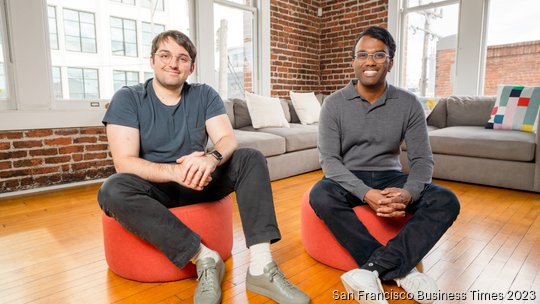
CEO Keith Peiris co-founded the company in 2020 and set up Tome’s headquarters in San Francisco’s South Beach neighborhood. The team trained Tome’s system with OpenAI’s GPT, or “Generative Pre-trained Transformer,” software, as well as Stable Diffusion, an image generator developed by Stability AI, a U.K.-based startup with an office in Palo Alto.
Instead of manually building a PowerPoint or Google Slides presentation, Tome’s users can generate a complete draft in seconds with a simple sentence or two.
“We thought that content generation and refinement using artificial intelligence was starting to get to a really useful state,” Peiris said, and now “it seems like we’ve got this narrow shot at building a true, first in the world AI-native storytelling company.”
Another San Francisco startup, Forethought, has been developing AI-powered customer service tools since 2017 and is headquartered in the Financial District. It has more than 100 employees across the U.S. and Canada.
CEO Deon Nicholas co-founded the company after studying math and interning at tech companies as an undergraduate at the University of Waterloo in Canada. His experiences while working at a local drugstore also sparked his curiosity around using technology to improve customer service outcomes.
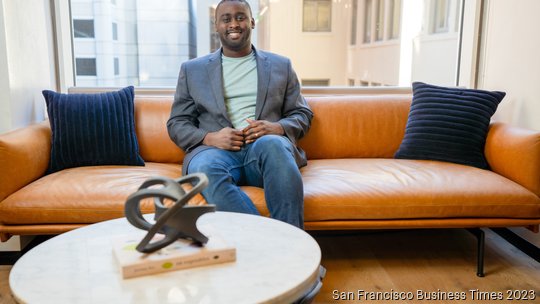
Nicholas views Forethought’s software like a copilot, not a replacement, for customer support workers. Its software ingests a company’s data, indexes it and then trains it to automatically respond to queries on web and chat applications.
Just a few years ago, it took a lot of work trying to convince other businesses that AI-powered tools were worth their time and money, Nicholas said.
“What’s really shifted now is, because it’s mainstream, everyone is demanding that ChatGPT experience,” Nicholas said. “Our strategy has shifted from having to educate the market to, ‘hey, guys, it’s here.’”
Ethical applications
Dragutin Petkovic has been researching AI since the 1980s and oversees an ethical AI graduate-level certificate program at San Francisco State University where he is a professor in the computer science department.
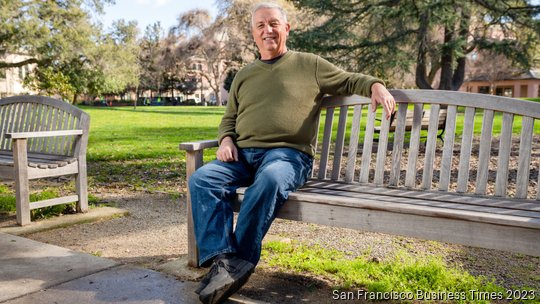
The biggest ethical considerations are in “high risk” industries like health care and the military, which were some of the earliest developers and users of AI, Petkovic said.
“Now, it’s actually encroaching on every aspect of human life. Rental approvals, loan approvals, bail determinations, hiring, autonomous cars that make mistakes … The genie is out of the bottle,” Petkovic said. “People should be cautious, for sure. Some will fear it. Maybe fear is good to balance the hype, because if you don’t have a fear, the hype overruns you.”
An enormous amount of data is required to train AI models, and doing so also still requires a lot of manual human intervention.
“None of these things actually is intelligent. They don’t generalize. They basically look at training samples and try to mimic the decisions made on those samples as it was provided by training data,” Petkovic said. “Most of the biases in AI come from inadequate training data.”
Privacy, legal and labor issues also persist. These fears have also prompted other industry insiders to call for caution.
The nonprofit Future of Life Institute published an open letter in March calling for a six-month moratorium on developing any AI systems that are “more powerful than GPT-4,” OpenAI’s most advanced model. “Powerful AI systems should be developed only once we are confident that their effects will be positive and their risks will be manageable,” the letter said.
